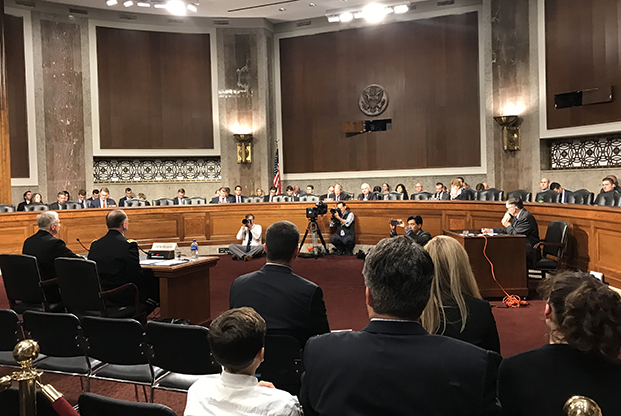
Navy Vice Adm. Craig Faller (left) and Army Gen. Robert Abrams (right) testify before the Senate Armed Services Committee on Sept. 25, 2018. Staff photo by Jennifer-Leigh Oprihory.
The indefinite ?suspension of military exercises with South Korea slightly degraded combined-force readiness in the region, but was needed to pave the way for improved US-North Korea relations, the nominee to lead US forces on the Peninsula said Tuesday.
US Army Gen. Robert Abrams, commanding general of US Army Forces Command and President Trump’s pick to succeed Army Gen. Vincent Brooks as United Nations Command/Combined Forces Command/United States Forces Korea commander?, told the Senate Armed Services Committee that the move was a “‘prudent risk’ if we’re willing to make the effort to change the relationship with the DPRK.”
“Something has to adjust, in my view, to be able to start to build trust and confidence as we move forward in the relationship,” he said.
However, in his official response to “advance policy questions” from SASC, Abrams called it “too ear?ly to tell” whether the decision—which grew out of President Donald Trump’s Singapore summit negotiations with North Korean leader Kim Jong un—?has? noticeably changed the nation’s behavior.
During the hearing, Abrams said that the suspension of the Ulchi F?reedom Guardian command-and-control exercise hurt readiness since it is “a key exercise to maintain continuity and to continue to practice our interoperability,” but that he has “great confidence that Gen. Brooks and the team there have instituted a mitigation plan to be able to sustain that until the next series of exercises are planned.”
Abrams—who reassured Sen. Jeanne Shaheen (D-N.H.) that he had, in fact, “seen some of the mitigation plan”— said the proposal “includes participation in a smaller level of staff exercises that would not be of the same scale, scope and volume in the information domain as” an exercise like Ulchi Freedom Guardian. More than 17,000 American troops participated in last year’s iteration of the annual exercise that the US typically co-hosts with South Korea, according to DOD.
When Sen. Gary Peters (D-Mich.) asked him “how long and how many cycles of exercises can be skipped before you really start seeing any significant decline in readiness,” Abrams couldn’t readily provide an answer. He said “that’s hard to judge,” but promised to make the determination a post-confirmation priority.
“I know from my 36-plus years of service about what the shelf-life is of readiness of our forces to be able to conduct certain activities, but I need to apply that judgement based on what I assess when I get on the ground,” Abrams said.
In both his? verbal testimony and pre-submitted policy-question responses, Abrams underscored that the call on whether or not to resume US-South Korea military exercises wasn’t his to make.
?”The status of all future Alliance exercises are future decisions for Alliance leaders,” he wrote. “As far as I am aware, all exercises previously envisioned are expected to occur as originally scheduled.”